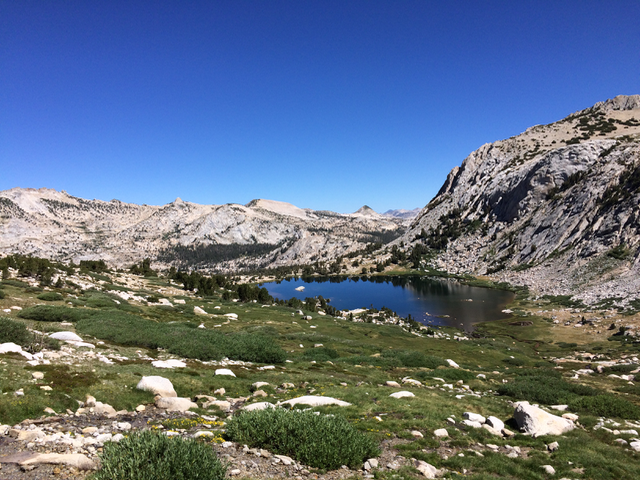So last week I was in the wilderness for some more time, this time with family. And there were several learnings as an outcome that are worth sharing.
 As context, Yosemite National Park is one of the world’s truly beautiful places, with the valley as an accessible way to see the glacier-carved rock. Beyond the valley, however, there is backcountry (mountains, rivers, lakes) that is only accessible by backpack, and I’ve done plenty of that. And then there’s one other option: the High Sierra Camps. There you can stay in tent cabins, eating prepared meals, but you can only get to them by horse or by hiking. (You can also get just meals, and carry in your tents and bags and all, which is what we did.) What this does is get you to a subset (a spectacular subset) of the high country, a chance to experience real wilderness without having to be able to carry a backpack.
As context, Yosemite National Park is one of the world’s truly beautiful places, with the valley as an accessible way to see the glacier-carved rock. Beyond the valley, however, there is backcountry (mountains, rivers, lakes) that is only accessible by backpack, and I’ve done plenty of that. And then there’s one other option: the High Sierra Camps. There you can stay in tent cabins, eating prepared meals, but you can only get to them by horse or by hiking. (You can also get just meals, and carry in your tents and bags and all, which is what we did.) What this does is get you to a subset (a spectacular subset) of the high country, a chance to experience real wilderness without having to be able to carry a backpack.
Also as context, I am a fervent believer in the value of wildness. As I expressed before, there’s the creativity aspect that comes from spending time in the wilderness. You can reflect on your regular world when you’re no longer tied to it. As you hike or ride along the trails, your mind can wander and process in the background. There are also mental health benefits to be found in escaping from the everyday clatter. (This is very necessary for me! :) And, importantly, the processes in nature provide a counter-balance to the artificial processes we put in place to breed plants and animals. The variation generated in the wild is a complement to our own approaches, just as computers are a complement to our brains. Consequently, I believe we need to preserve some of our natural spaces.
So, one of the learning outcomes is being able to experience the wilderness without having to be physically capable of carrying everything you need on your back. I reckon that if you can experience the wildness, you can appreciate it, and then can become a supporter. Thus, just the existence of these alternate paths (between cars and backpacking) means to me a higher likelihood of preserving the environment.
Similarly, there are rangers who visit these camps, and provide after-dinner campfire talks. They talk at dinner, talking about what they will be covering, but also advocating for the value of the programs and the wilderness. Similarly, the staff at the camps also do a good job of advocating for the wilderness (as they would), and there are guidebooks available for perusal to learn more, as well as information around the dining rooms (and great food!).
One of the larger learning lessons is that, once you’re in context, the interest is naturally sparked, and then you’re ripe for a message. Your curiosity gets stoked about why coyotes howl, once you hear them. Or you wonder about the geology, or the lifecycle of plants, or…you get the idea. Creating artificial contexts is one of the tricks of learning (please, don’t keep it abstract, it doesn’t work), but layering it on in context is increasingly doable and more valuable.
Meaningful engagement in context is a valuable prerequisite for learning. The reason we can go to conferences and get value (contrary to the old “you can’t learn from a lecture”) is because we’re engaged in activity and conferences serve as reflection opportunities. Sometimes you need to get away from the context to reflect, if the contextual pressures are too much, and sometimes the context naturally sparks reflection. Making time for reflection is a component of a learning organization, and getting support in context or having time away from context both are parts. So my recommendation is to support wilderness, and get out in it!
Thanks for sharing this, Clark.
I used to do lots of wilderness backpacking when Zoe was little–on of our parenting strengths.
Biking injuries have ruled out carrying backpacks these years. I really hadn’t considered this ‘tween option.